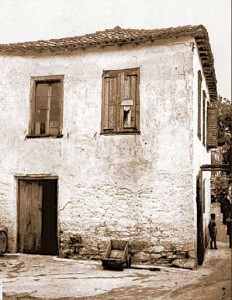(Rendered by Vassilis C. Militsis)
Among the many popular characters, who will always be the center of interest in the tales of the future story teller, paramount positions are held by the bad mother-in-law as well as the wicked step mother. Concerning the wicked step mother, I shall try to describe one some other time for the instruction of my readers. This tale is about the wicked mother-in-law.
Unhappy, young Dialechti, daughter of Uncle Manolis Kassadreos, who at the time of the Greek Revolution had migrated to an Aegean island, was wondering why she was to blame if she was barren and childless. She had married seven years before; since then she visited Aidepso’s Spa twice, five times she was administered diverse effective potions, but in vain: she remained unfruitful. A couple of gypsy women gave her to carry round the armpits miraculous talismans, assuring her that that was the only means to bear a child, and indeed a son. Finally, a monk from Sinai donated to her a sanctified rosary, telling her to dip it in the water and then drink the liquid. However, all was in vain.
At last, her despair was followed by the ease of conscience and no longer did she consider herself responsible. However, old Kantakaina, her mother-in-law, was not of the same opinion, and held her daughter-in law answerable for not bearing a grandson, a consolation in her old age.
It was true that Dialechti’s husband was the only child of this old woman, but he did not share his mother’s prejudice against his wife. Did she not give birth to a child, his line would disappear. And that was a peculiar attitude, for every Greek husband of the time held it a most holy duty and utmost necessity to procreate his species.
Whenever her son returned from his sea fares – he owned a lugger and was very daring and apt at sea travel – old Kantakaina went to welcome him, led him to her small cottage, read prayers over him, catechized him, and sowed discord between him and his wife, in an attempt to turn him against her. Not only did she enumerate his wife’s drawbacks but she also enhanced them; his wife was not only a marble slab – to wit sterile, as if that was not enough – she was also slovenly, unrestrained, brazen etc. she was a good for nothing, a childless woman.
Captain Kantakis, flabbergasted and sea-beaten, after this entire harangue, his mind grew biased. Then he went out to meet his fellow seamen, exchanged the usual welcoming greetings, took to drinking about seven or eight cups of rum, and under triple giddiness – from the sea, the womanish slander and the load of drinks – entered his house, where barbarous scenes took place between him and his wife.
Thus was the state of things until Christmas Eve of AD 186… Five days before Captain Kantakis had sailed on his lugger to the island across, loaded with lambs and kids, hoping to return and celebrate Christmas at home. But, as the Greek proverb went, he was settling his accounts without the hotel owner, i.e. without the northerly wind, which blew sudden and full blast causing all vessels to stay put in the lee. However, it has already been mentioned that Captain Kantakis was a daring and apt seaman. Around dusk on Christmas Eve the wind abated somewhat, but it was still blowing. At midnight again it gained force.
Some sailors in the market wagered that since the wind had let up, Captain Kantakis was expected to arrive by midnight. His wife however was not present to hear them say so and was not expecting him. Before evening she was visited by her mother-in-law, unusually kindly and smiling, who wished her, first of all, an auspicious coming of her husband and, for the thousandth time, the commonplace “may you blessed with a healthy son”.
And besides this, she offered her the traditional Christmas bannock.
I kneaded the dough myself, said Granny Kantakaina. May you enjoy it in good health.
I’ll treasure it till the Epiphany, so it can be sanctified, added her daughter-in-law.
No, no, said the old woman in an uncanny hurry. A housewife keeps her own bannock for the Epiphany all right, but the gift is consumed.
Very well, replied Dialechti, your ladyship knows better.
Dialechti was a very innocent soul, and she could never imagine or suspect something evil.
“How come my mother-in-law brought me a Christmas Bread?” she thought to herself. As soon as the old woman left, Dialechti locked her house and slept with a ten-year-old neighbor girl, who kept company with her as long as her husband was away. Dialechti turned in early, because she wanted to attend the early mass at the church around midnight. The church was only fifty yards from the house.
About midnight there was a protracted peal from the church bells. Dialechti got up, dressed and went off to church. It was agreed that the little girl was to stay with her till matins. Therefore, she roused her and led her to join her siblings, next door. The two houses comprised a semi-detached edifice.
Dialechti ascended the steps to the loft of the church, reserved for womenfolk. After half an hour, a poor and unhappy lame woman, who served as the sexton of the church, came over and whispered to her:
Give me the key to your house. Your husband has returned.
My husband! Exclaimed Dialechti surprised.
But instead of handing the key, she rushed down the stairs herself.
Arriving at the steps of her house she saw her husband soaked and dripping water and sea surf.
I’m half drowned, he only murmured, but it’s nothing serious. Instead of being stranded we ran aground in the shallows.
Were you wrecked? Cried Dialechti.
No, don’t worry. The ship is secured with her two anchors on the shallows.
Shall I build a fire?
Do, and fetch some dry clothes to change.
Dialechti took out some clothes from the press and built a fire for her husband to warm.
Shall I fix you some hot drink?
No hot drink is good enough for me, said Captain Kantakis. Draw some wine.
Dialechti drew some wine from the cask.
How come you haven’t prepared something to eat? Grunted the sailor.
I wasn’t expecting you tonight, Dialechti replied humbly. I’ve bought some meat. Shall I barbecue a stake?
Put one on the embers and off you go to your church, said Captain Kantakis. I’ll come shortly, too.
Dialechti put the meat on the already glowing embers and was getting ready to follow her husband’s instruction, which after all was also her own desire, because she must receive the Holy Communion. It should be noted that Kantakis gave his phrase off you go to your church a sour tinge.
My mother seems not to know I’ve come, remarked Kantakis anew.
She must be at her own parish church. Shall I go and tell her?
Go and tell her to come over in the morning.
Dialechti was already at the door when Kantakis suddenly called her back.
Do you think it proper to go to church alone and leave me here all to myself?
Then let me take the Eucharist and I’m soon back, replied his wife.
Kantakis did not dare to oppose her because his response would be a blasphemy. However, he uttered a silent one.
Dialechti made sure to dispatch a messenger, a twelve-year-old boy from the next door family, whose daughter had slept by her the previous evening, to her mother-in-law, and went back to church.
Kantakis, who was starving, began to devour the stake. Squatting down by the fireplace, he was lazy to get up and open the cabinet, where the bread was kept. But on the left-hand side on the wooden mantelpiece was the Christmas Bread, that bannock given by his mother as a gift to her daughter-in-law. He reached for it and ate it almost all of it with the barbecued meat.
Around dawn Dialechti returned from the church, where she found her mother-in-law embracing her son’s brow moaning and wailing.
She had come some moments before and found her son stiff dead. Lifting her eyes she observed the absence of the bannock from the mantelpiece, and all became clear to her. Kantakis had eaten the poisoned Christmas Bread, which the old vixen had prepared for her daughter-in-law.
There were no proper doctors on that small island, so no post mortem autopsy was carried out. It was believed that his death was due to the cold contracted as the aftermath of the shipwreck. It should also be noted that the old woman, conscious of her crime, did not accuse her daughter-in-law. On the contrary, she stood up for her against the virulent gossip of the people.
If she lived to celebrate other Christmasses, the heartless mother-in-law and unwitting infanticide did not enjoy a happy old age.
http://www.mesenikolas.gr/en/index.php?option=com_content&task=view&id=34&Itemid=61
Source: greeknewsonline.com
Ask me anything
Explore related questions








